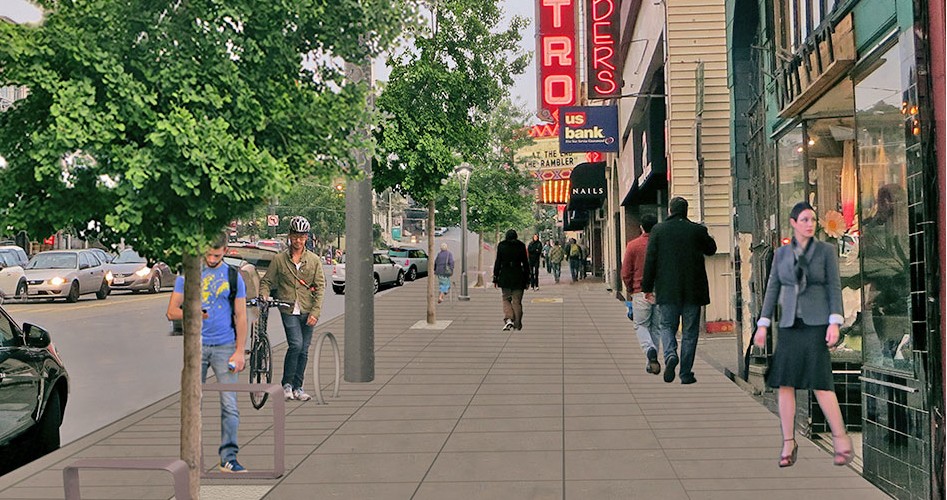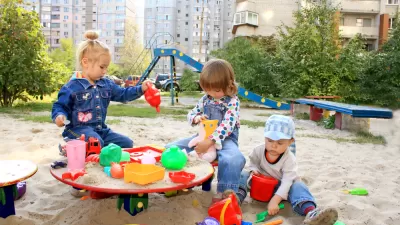A new study based on an analysis of the residents of Turin, Italy, a city of over 900,000, reveals that walkable access to public transit and urban services benefits mental health, particularly for women and seniors.

Last weekend I was enjoying a coffee at the outdoor seating of Castro Coffee on the widened Castro Street in San Francisco.
Credit: Castro Street Improvement Project
An elderly Asian women asked if she could join me due to the limited seating, and we soon struck up some small talk. She lived nearby in her 47-year-old son's home, and she told me of all the transit—bus, light rail, and streetcar lines near her home, particularly which ones took her to Japantown. She called the buses her "limousines" because they would drop her off right in front of her home.
Along comes this study published in the International Journal of Environmental Research and Public Health that completely validates everything she said. Access to multiple transit lines and living within walking distance to a vibrant business district appears to be contributing to this senior's mental (as well as physical) health.
"For the study, a group of Italy-based researchers gathered long-term data on Turin residents," writes Eric Jaffe, CityLab’s New York bureau chief...."Of the environmental factors, density and transit access proved “protective” of mental health, especially for women (of all ages) and older people (age 50 to 64)."
These populations were prescribed fewer antidepressant drugs when they lived in places reached more quickly by bus or train, in places with taller average building heights, compared with counterparts in more remote or sparse areas. That connection held up even when social factors were taken into account.
A look through Planetizen posts tagged 'mental health' shows no lack of articles showing a nexus with green spaces or trees, yet the Turin study showed no such connection "between mental health and public green space," writes Jaffe. "That’s surprising considering the vast evidence supporting this link." [See 'related' below.]
Conclusion from the study's abstract:
Therefore, this research suggests that good accessibility to public transport, as well as a dense urban structure (versus sprawl), could contribute to reduced risk of depression, especially for women and elderly, by increasing opportunities to move around and have an active social life.
Hat tip to Metro Transportation Library.
FULL STORY: Living Near a Transit Line Might Be Good for Your Mental Health

Maui's Vacation Rental Debate Turns Ugly
Verbal attacks, misinformation campaigns and fistfights plague a high-stakes debate to convert thousands of vacation rentals into long-term housing.

Planetizen Federal Action Tracker
A weekly monitor of how Trump’s orders and actions are impacting planners and planning in America.

In Urban Planning, AI Prompting Could be the New Design Thinking
Creativity has long been key to great urban design. What if we see AI as our new creative partner?

Cal Fire Chatbot Fails to Answer Basic Questions
An AI chatbot designed to provide information about wildfires can’t answer questions about evacuation orders, among other problems.

What Happens if Trump Kills Section 8?
The Trump admin aims to slash federal rental aid by nearly half and shift distribution to states. Experts warn this could spike homelessness and destabilize communities nationwide.

Sean Duffy Targets Rainbow Crosswalks in Road Safety Efforts
Despite evidence that colorful crosswalks actually improve intersection safety — and the lack of almost any crosswalks at all on the nation’s most dangerous arterial roads — U.S. Transportation Secretary Duffy is calling on states to remove them.
Urban Design for Planners 1: Software Tools
This six-course series explores essential urban design concepts using open source software and equips planners with the tools they need to participate fully in the urban design process.
Planning for Universal Design
Learn the tools for implementing Universal Design in planning regulations.
Appalachian Highlands Housing Partners
Gallatin County Department of Planning & Community Development
Heyer Gruel & Associates PA
Mpact (founded as Rail~Volution)
City of Camden Redevelopment Agency
City of Astoria
City of Portland
City of Laramie





























